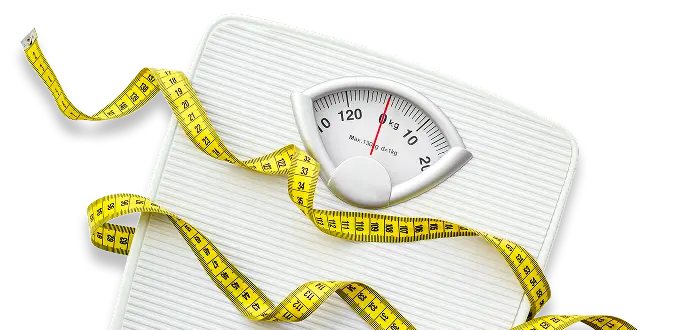By 2035, 1 in
2 Indians
Will Be Affected by Obesity
Your Weight Management
Journey is Unique
Let's Help You Lose Weight Sustainably
What is Obesity
Obesity is a long-term medical condition where the body stores too much fat. It's not just about willpower — genetics, hormones, and lifestyle all play a role.
Left unaddressed, obesity can lead to serious health problems like diabetes, heart disease, and joint issues, making everyday life harder and less enjoyable.

What Causes Obesity?

Genetics
Family history or genetic factors, affecting metabolism and fat storage

Inactive Lifestyle
A sedentary lifestyle, due to prolonged screen time or lack of exercise

Unhealthy Diet
Unhealthy eating habits, consuming calorie-rich or junk foods

Health Issues
An underlying chronic condition, like diabetes or cardiovascular issues

Stress
High stress levels & poor sleep patterns, these affect metabolism

Poor Sleep
Hormone-related conditions, like Thyroid Disorder or PCOS
How Can You Diagnose Obesity

Body Mass Index (BMI)
A ratio of weight to height that helps assess body fat

Waist Circumference
Indicates abdominal fat, which is linked to higher health risks
Understand your BMI
These are BMI markers you should be aware of.
Formula: BMI = weight (kg) / height (m)²

BMI Calculator
Fill in your height and weight in order to receive your result.
Your BMI Score is 0
Please enter valid height and weight
6 Serious Health Risks Linked to Obesity
Effective Weight Loss Requires Personalised Solutions
Prescription Medicines
Weight loss medicines are essential but should only be used under medical supervision following a full assessment.
Medical Investigation
Treating conditions like Hypothyroidism or PCOS helps with healthy weight loss.
Behavioural Therapies
De-stress with yoga or mindful breathing, keep a food journal, & get enough sleep.
Mindful Eating
Controlled food portions, mindful calorie intake, & a balanced diet help with healthy weight loss.
Active Lifestyle
Daily movement, from walking to workouts, boosts metabolism & burns fat. Choose exercises wisely to avoid injury.
Natural Remedies
Green tea, apple cider vinegar or ayurvedic drinks may aid some people but are not effective for everyone.
Surgical Solutions
Options such as gastric bypass or sleeve gastrectomy are available but carry risks & should be carefully considered.
WeighRight: A Holistic, Expert-Led
Weight Management Solution
 Free Consultations
Free Consultations
 Full Body Assessments
Full Body Assessments
 Savings on Lab Tests & Medicines
Savings on Lab Tests & Medicines


Healthier Alternatives To Support Your Journey
While lifestyle changes remain the foundation for addressing obesity, additional supportive strategies can make a huge difference.
Learn About Weight Loss
Get expert insights that go beyond calories and diets.
FAQs on Weight Loss
Q. How to lose weight quickly?
While rapid weight loss may seem appealing, the healthiest and most sustainable way to lose weight is gradually. To lose weight, you must focus on reducing refined carbs and added sugars, increasing your intake of lean protein and vegetables, staying hydrated, and engaging in regular physical activity like cardio and strength training. Always consult a healthcare professional before starting any rapid weight loss plan.
Q.Can medications cause weight gain?
Yes, some medications, such as antidepressants, corticosteroids, and insulin, can lead to weight gain as a side effect. It is advised to consult a doctor to confirm the underlying cause.
Q. Can stress result in weight gain?
Chronic stress triggers the release of stress hormones, such as cortisol, which can increase appetite and cravings for high-calorie foods, leading to weight gain over time.
Q. How can excess weight affect your health?
Obesity increases the risk of type 2 diabetes, heart disease, high blood pressure, stroke, joint problems, sleep apnea, and certain cancers.
Q. How many calories should I eat to lose weight?
Calorie needs vary depending on your current weight and the goal you're aiming to achieve. However, creating a daily deficit of 500 to 750 calories can help you lose about 0.5 to 1 kg per week. It is advised to consult a nutritionist for a personalised plan.
Q. Is exercise necessary for weight loss?
While diet plays a major role, regular exercise boosts metabolism, burns calories, and helps maintain muscle mass, making weight loss more sustainable. A combination of cardio (like walking, running, cycling) and strength training is most effective for losing weight and improving overall fitness.
Q. Can I lose weight without dieting?
Weight loss without dieting strictly is possible. You will have to focus on clean & mindful eating (cutting down refined and processed foods), control your portion size, and increase daily physical activity.
Q. How does sleep affect weight loss?
Poor sleep disrupts hunger hormones (leptin & ghrelin), leading to increased appetite and cravings, which can hinder weight loss and contribute to weight gain.
Q. Are weight loss supplements safe and effective?
While some weight loss supplements may be effective, many may not be FSSAI-approved and can have side effects. It's safer to consult a healthcare professional before taking any supplement and rely on evidence-based approaches like a healthy diet and regular exercise.
Q. When should I consult a doctor for weight issues?
If you're unable to lose weight despite making lifestyle changes or if the excess weight is affecting your health, consult a doctor or weight loss specialist for guidance.



































